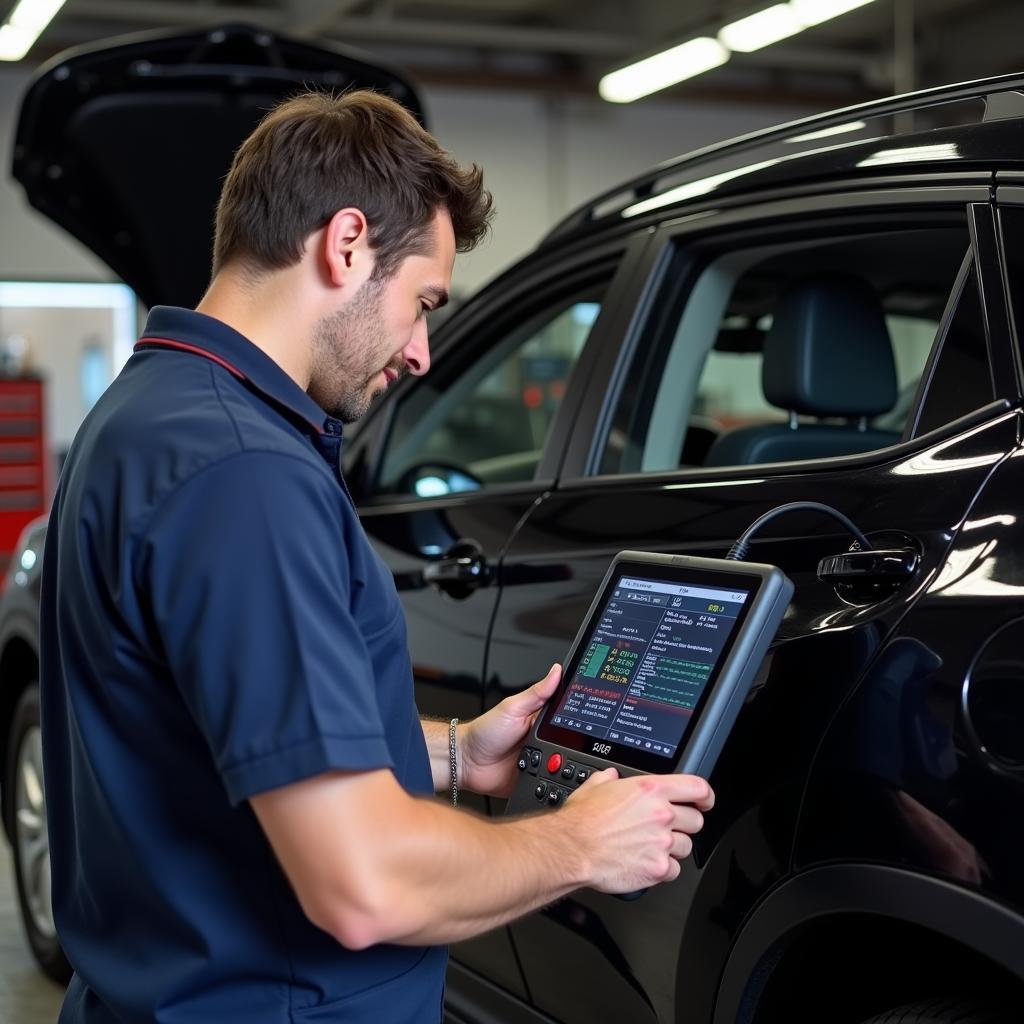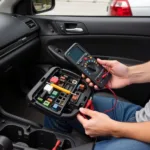A car diagnostic tool is an essential piece of equipment for any mechanic, professional or DIYer. It allows you to communicate with your car’s computer system, uncovering hidden problems and providing valuable insights into its overall health. But what does a car diagnostic tool do, exactly, and why is it so important in today’s automotive world? Let’s dive into the specifics.
Understanding the function of a car diagnostic tool requires understanding a bit about your car’s computer system. Modern vehicles are equipped with sophisticated onboard computers, constantly monitoring various systems and sensors. These computers log diagnostic trouble codes (DTCs) when something goes wrong. A car diagnostic tool, also known as an OBD-II scanner, acts as a bridge between you and this computer, allowing you to read these codes and understand what they mean. This provides crucial information for troubleshooting and repair. You can find out more about comprehensive diagnostics at our full car diagnostic page.
Decoding the Secrets: How Car Diagnostic Tools Work
Car diagnostic tools work by plugging into your vehicle’s OBD-II port, usually located under the dashboard on the driver’s side. Once connected, the tool communicates with the car’s computer, retrieving stored DTCs. These codes are standardized, meaning they represent specific issues across different makes and models. The tool then displays the code, often accompanied by a description of the problem. This allows you to pinpoint the source of the issue, saving you time and money on unnecessary repairs. Some tools even provide live data streams from various sensors, enabling real-time monitoring of engine performance and other parameters. For specific diagnostic needs in certain regions, you might be interested in our car diagnostics cape town services.
What Can a Car Diagnostic Tool Tell You?
A car diagnostic tool can reveal a wealth of information about your car’s health, far beyond simply reading trouble codes. It can provide data on engine performance, transmission function, emissions systems, ABS, airbags, and much more. This information is invaluable for diagnosing complex problems, monitoring ongoing issues, and even preventing future breakdowns. By understanding the data provided by the tool, you can gain a deeper understanding of your car’s overall condition.
Understanding Diagnostic Trouble Codes (DTCs)
DTCs are the language of your car’s computer. Each code corresponds to a specific problem or malfunction within a particular system. Understanding these codes is essential for interpreting the information provided by your diagnostic tool. While a generic code reader may simply display the code, more advanced tools often provide a description of the problem, helping you understand its potential impact and necessary repairs.
 Mechanic Using Diagnostic Tool in Workshop
Mechanic Using Diagnostic Tool in Workshop
Beyond the Codes: Accessing Live Data
Many car diagnostic tools offer the ability to view live data streams from various sensors throughout the vehicle. This provides real-time insights into engine parameters such as RPM, coolant temperature, fuel pressure, and oxygen sensor readings. Accessing this live data allows you to monitor your car’s performance under various conditions, identify intermittent problems, and even fine-tune certain systems for optimal performance. If you are looking for a specific diagnostic tool, you might find our review of the ctech obd2 wifi car diagnostic tool for ios android windows useful.
Choosing the Right Car Diagnostic Tool
With so many different car diagnostic tools available on the market, choosing the right one can seem daunting. Factors to consider include your budget, your level of technical expertise, and the specific features you need. Basic code readers are affordable and suitable for reading and clearing DTCs, while more advanced scan tools offer live data streaming, bidirectional control, and other advanced functionalities. Consider your needs and choose a tool that will provide the information and functionality you require. For localized diagnostics, you can explore our car diagnostic in boksburg page.
Conclusion: Empowering Car Owners and Mechanics
A car diagnostic tool is an invaluable asset for anyone who wants to understand and maintain their vehicle. It empowers you to take control of your car’s health, diagnose problems quickly and accurately, and save money on unnecessary repairs. From reading trouble codes to monitoring live data, a car diagnostic tool provides the insights you need to keep your car running smoothly.
FAQ:
- What is the OBD-II port? The OBD-II port is a standardized connector found in most vehicles manufactured after 1996, used to access the car’s computer system.
- Can I clear trouble codes with a diagnostic tool? Yes, most diagnostic tools allow you to clear DTCs after addressing the underlying issue.
- Are all diagnostic tools compatible with all cars? Most modern tools are compatible with OBD-II compliant vehicles, but some specialized tools may be required for older models or specific makes.
- How much does a car diagnostic tool cost? Prices range from affordable basic code readers to more expensive professional-grade scan tools.
- Do I need a diagnostic tool if my check engine light isn’t on? While the check engine light is a common trigger for using a diagnostic tool, it can also be helpful for preventative maintenance and monitoring overall vehicle health.
- Can I use a car diagnostic tool on my motorcycle? Some diagnostic tools are compatible with motorcycles, but it’s important to choose one specifically designed for that purpose.
- Where can I learn more about interpreting DTCs? Numerous online resources and repair manuals provide detailed information on specific DTCs and their meanings.
Common Situations and Questions:
- My car is shaking: A diagnostic tool can help identify problems with the engine, transmission, or suspension that might be causing the shaking.
- My car is losing power: The tool can pinpoint issues with fuel delivery, ignition, or other systems that affect engine performance.
- My gas mileage has decreased: A diagnostic tool can help identify problems with the fuel system, sensors, or other components that might be contributing to poor fuel economy.
Further Exploration:
For more information on specific car diagnostics, you can explore other articles on our website.
Contact Us:
For immediate assistance, please contact us via WhatsApp: +1(641)206-8880 or Email: [email protected]. Our customer service team is available 24/7.

